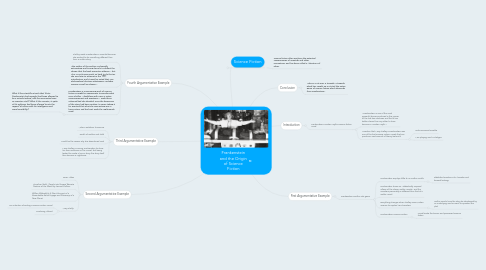
1. Second Argumentative Example
1.1. Brian Aldiss
1.2. Jonathan Swift...Travels into Several Remote Nations of the World by Lemuel Gulliver
1.3. Willem Bilderdijk's A Short Account of a Remarkable Aerial Voyage and Discovery of a New Planet
1.4. Mary Shelly.
1.4.1. NO intention of writing a science Fiction Novel
1.4.2. Practicing Atheist
2. Third Argumentative Example
2.1. Victor's ambition to science
2.2. Death of mother and child
2.3. Could be the reason why she abandoned God
2.4. Mary Shelley's is using Frankenstein to show her own emotions on the Novel, first being tasked to create a horror story, the story itself then became a nightmare.
3. Fourth Argumentative Example
3.1. Shelley made Frankenstein a scientist because she wanted to do something different than from a Gothic story.
3.2. "the author of the preface is shrewdly anticipating and trying cleverly to deflect the charge that the book promotes atheism -- but 'she' is not trying nearly so hard to do that as she was later to attempt in the 1831 introduction, and it must be noted that 'any philosophical doctrine whatsoever' includes science as well as religion''.
3.3. Frankenstein is a pioneering work of science fiction is might by appropriate to wonder what Mary Shelley -- doubtless with Percy's active encouragement and assistance -- might have achieved had she decided, once the beginning of the story had been written, to cease taking it for granted that what she was writing was a horror story and had cast aside the nightmarish seed.
3.3.1. What if the scientific miracle that Victor Frankenstein had wrought had been allowed to be a miracle indeed, and the resurrected man no monster at all? What if the monster, in spite of his ugliness, had been allowed to win the respect of others with his intelligence and moral sensibility?
4. Science Fiction
4.1. Science fiction often explores the potential consequences of scientific and other innovations, and has been called a "literature of ideas.
5. Introduction
5.1. Frankenstein=modern myth=Science fiction novel
5.1.1. "Frankenstein is one of the most powerful stories produced in the course of the last two centuries and that it has better claims than any other to have become a 'modern myth'."
5.1.2. Assertion that Mary Shelley's Frankenstein was one of the first Science Fiction novels that can produce a vast amount of theory behind it
5.1.2.1. Proto-Femensit Parable
5.1.2.2. Man playing God Archetype
6. First Argumentative Example
6.1. Frankenstein=Gothic sub genre
6.1.1. Frankenstein employs little to no Gothic motifs
6.1.1.1. Stableford mentions it's "broader and forward looking"
6.1.2. Frankenstein shows no "diabolically inspired villains of the classic Gothic novels" and the monsters personality is different than that of a Gothic novel.
6.1.3. Everything changes when Shelley uses Modern Science to explain her characters
6.1.3.1. Gothic novels have the story be developed by an underlying God or Devil to question the plot
6.1.4. Frankenstein=Science Fiction
6.1.4.1. Novel broke the barrier and pioneered science fiction

